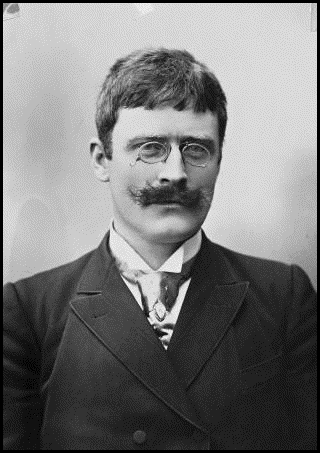Knut Hamsun
Robert Ferguson, Translator
(Souvenir Press)

The Ring Is Closed is different. It doesn't make you hungry: far from it. It makes you wonder several things. Makes you wonder about heroes and anti-heroes. Makes you wonder how people can craft a novel with such (apparent) ease. Makes you, most of all, wonder how a writer was able to create a Meursault long before Camus was out of knee-pants.
For Abel Brodersen, the hero of The Ring is Closed, is a man who manages to live above and beyond the usual push-me-pull-you of commerce, needs, and, yes, hunger. He is even able to float above what we humans dare to call "morals." He steals when he is hungry, takes a job when people want him to (and leaves it as easily when he is bored). He even shoots people when he is angered ... hitting the wrong target.
Olga, one of the many ladies who litters his field (he's like that: even his step-mother falls in love with him), complains about his lack of get-up-and-go:
- "I still owe you a thousand kroner. It's terrible ---"
"Don't think about it."
"Don't you ever save anything?"
"No," he said.
"Well in that case you won't have anything for later on. You had an inheritance, you could have been one of the big shots in town if you'd held on to what you had."
"All you people with drive, you don't get that far either. You get a bit rich, a bit arrogant, and a bit envious, and that's about all. My old school pals haven't done all that much better than me. I wouldn't trade places with them."
Those of us who have tried writing a novel suppose that it would be doubly difficult to write a novel about a man who wants for nothing, seems to live for nothing, is content with nothing. Hamsun pulls it off in a Norwegian mirror to Sinclair Lewis --- but what he has created has so much more finesse (he was to go on to win the Nobel Prize for literature in 1920).
There are tales here of those who win, those who lose, and those who screw each other (physically, financially, emotionally). In the very center of it all is a man who scarcely reacts to hate, greed, hunger, Perhaps he is an Anglo-Saxon Buddha ... one who floats stolidly above the things that drive you and me crazy.
But there is also another hero here. It is America, the place where Abel found his first and only love, in Kentucky, just before he returned to his Norwegian village, dark Angèla: "She was wonderful to me. I sank to the bottom and she was there too, we both lived at the bottom. So did the people around us."
- You probably think it's awful to have just a few clothes and not much food, but that's not what matters, together we were blessed, we were like animals. We lay down together in our ruination and we slept together. When we woke up we said nothing, just got up and walked, when one got up and walked the other followed along behind. We belonged together on the same path and we followed each other.
Like his hero, Hamsun is a wanderer, and the story of The Ring Is Closed wanders about up and down the streets and the nearby fjords and sometimes we wonder if Abel (or Hamsun) are ever going to get anywhere what with all those people around telling him to get a job, make something of his life ... like Benjamin's father in The Graduate telling him to "get off your ass and do something."
But Abel marches to the sound of his own quiet drummer and we find out at the end, spun out so expertly, a murder mystery, The Ring Is Closed turns out to be a murder mystery, and the only thing that could move Abel, make him get off his ass and do something is the love he had for his Angèla and his best friend Lawrence, back there in Kentucky ...
... No, I'll say no more. For all its alarms and diversions, this one grows on you --- so you go back to it trying to figure out how a writer could come up with something so apparently simple (simple man, simple woman, simple love) and turn it into something so complex that it can knock you off your feet, drive right over you, leave you wondering how you could have ever missed the force of it in the first place.